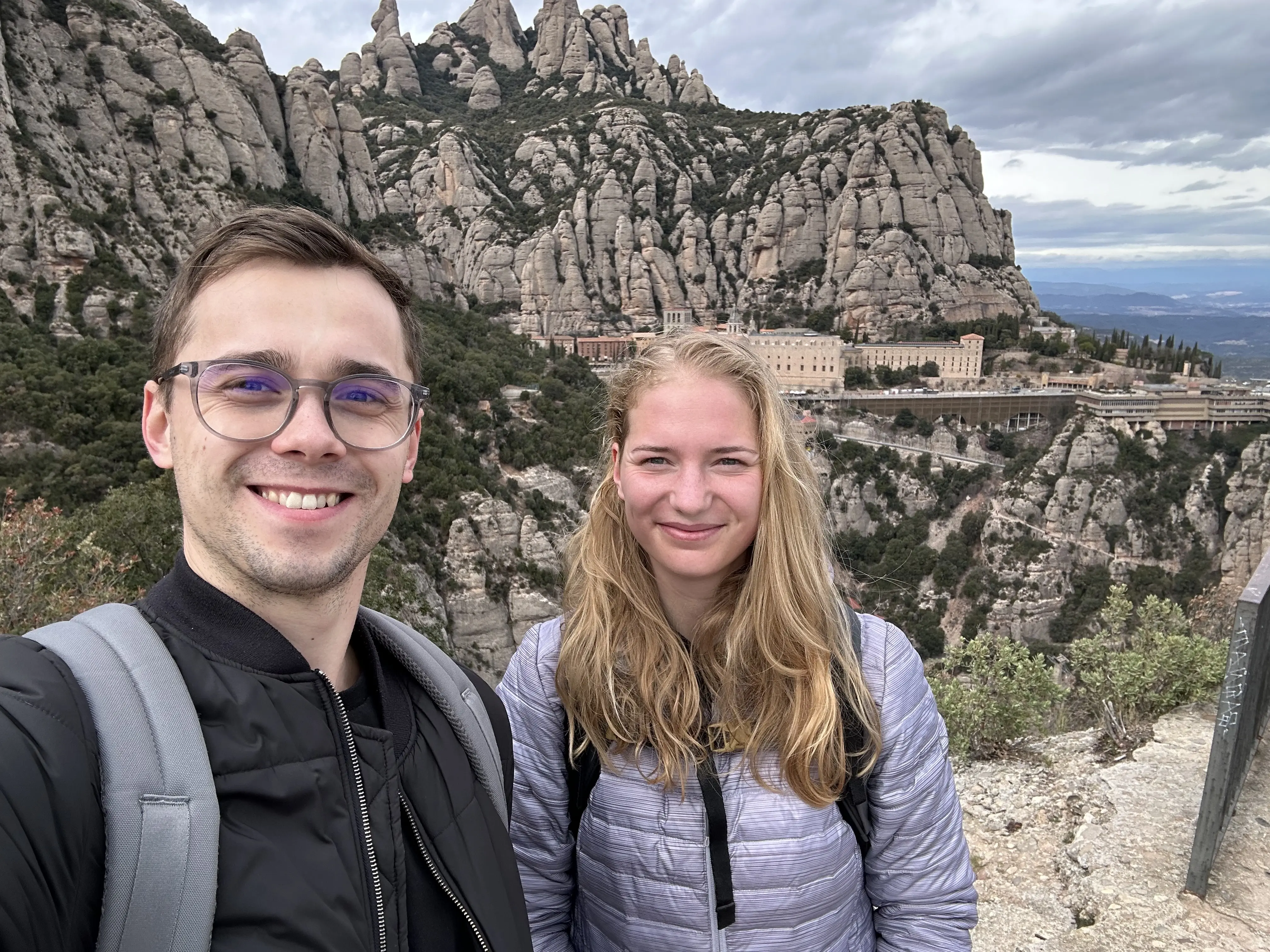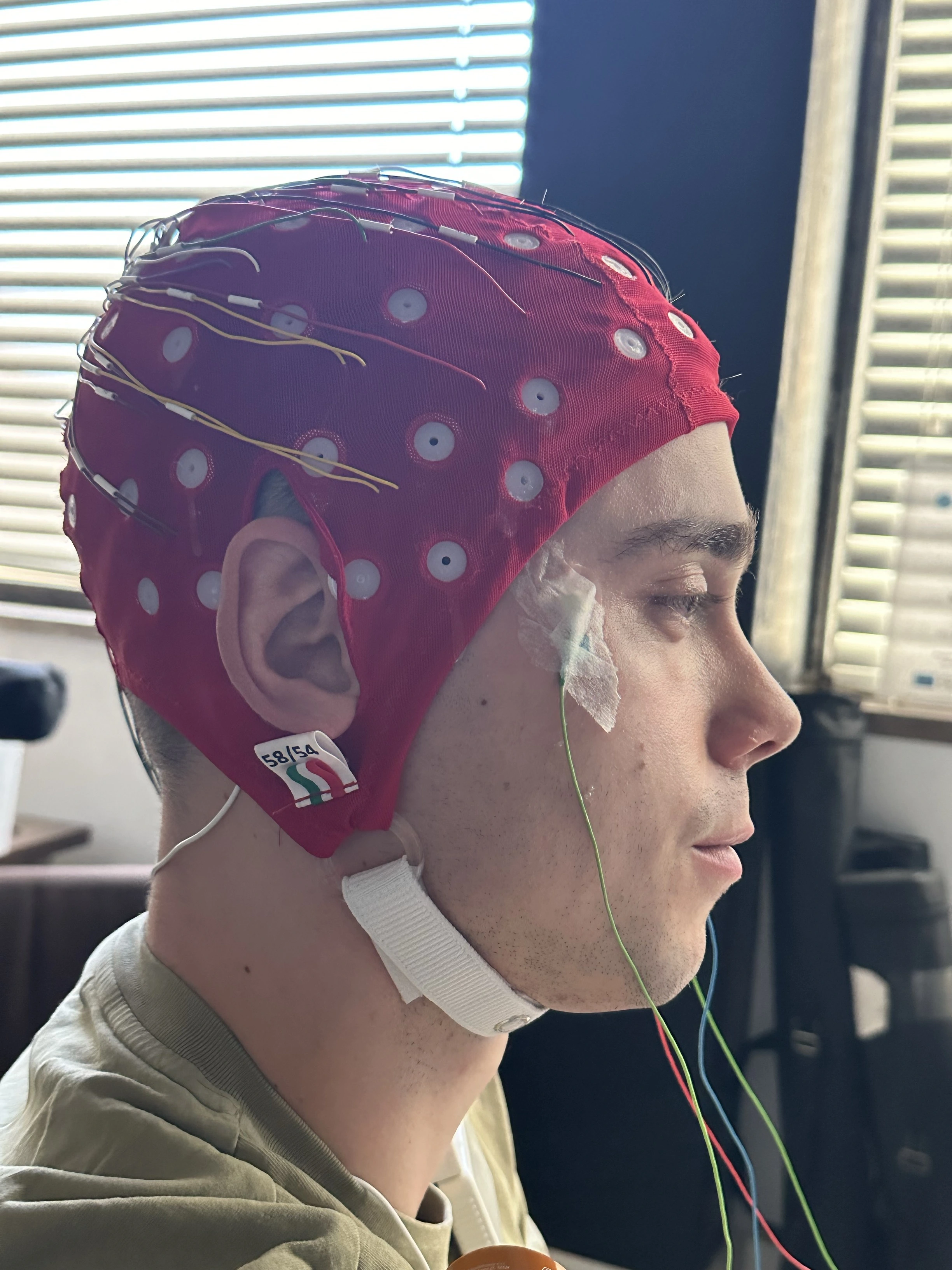Exploring EEG Research and City Wonders: A Journey from Maribor to Barcelona
In February, our PhD students, Nina Murks and Leon Kutoš, commenced an extended research visit at the Universitat Politècnica de Catalunya. We sat down for an interview with them to delve into their comprehensive experience during this significant journey.
How long was your stay in Barcelona?
We were in Barcelona for one month, from February 4th to March 3rd.
What were the primary activities and goals of your stay in Barcelona?
Our main focus during our stay was to immerse ourselves in learning and applying experimental protocols, setups, and techniques for recording and preprocessing electroencephalograms (EEG) while conducting motor tasks. Additionally, we delved into learning and practicing brain source localization techniques such as sLORETA, and assessing functional connectivity from EEG data.
What did a typical day in Barcelona look like for you?
On weekdays, we typically rose around 7 am, indulged in
breakfast at home, then embarked for the university around 8
am, arriving by 9 am via the subway metro. Nina often made a
pit stop at the canteen for her morning caffeine fix en route
to the lab. Energized and ready, our days unfolded with either
preparing for recording sessions — graciously facilitated by
Marta, Ferran, Elena, and Mehdi, who made them frequent
occurrences—or delving into learning brain source localization
techniques and conducting brief analyses of previously
recorded signals to refine our methods. Throughout our stay,
we had the privilege of working in the lab alongside fellow
researchers, fostering connections and even attending
presentations on various PhD topics. The lab culture was
inviting, often punctuated by coffee breaks where we got to
know our colleagues better. At 1 pm, the entire lab convened
for lunch and casual conversation.
Additionally, we want to highlight our visit to the Gutmann
Institute, where Dr. Hatice Kumru Cam graciously gave us a
tour. We were deeply impressed by the institute's
rehabilitation center, which catered to individuals with
various neurological impairments. Witnessing the innovative
approaches to rehabilitation, such as adapting stairs of
different heights for patients' mobility practice, a fully
functional kitchen for home adaptation assessments, and a
well-equipped gym for strength training, left a lasting
impact. Furthermore, observing the interdisciplinary
collaboration among surgeons, speech therapists,
physiotherapists, and psychiatrists underscored the
comprehensive approach to patient care at the institute.
What were your initial impressions of your colleagues' laboratories and facilities in Barcelona?
Our initial impressions were overwhelmingly positive. The people in the lab were incredibly friendly and open to engaging with us, whether it was about EEG signals, source localization techniques, or even recommendations for the best local eateries. Their willingness to share knowledge and assist us with any queries was truly commendable.
In what ways did the work experience in Barcelona differ from that in Maribor, particularly in terms of working hours, the balance between theoretical and practical work, and communication with colleagues?
Our time in Barcelona revealed some interesting distinctions from our routines in Maribor. One notable difference was the start of the workday. Unlike our early riser habits in Slovenia, where we typically began work around 7 or 8 am, our colleagues in Barcelona tended to arrive later, often around 9 or 9:30 am. Another contrast was in lunchtime practices. While many in the Barcelona lab brought homemade lunches, we often opted for meals from the canteen, enjoying the convenience. Moreover, we found the lab space in Barcelona to be notably larger than what we were accustomed to, offering ample room for collaboration and experimentation. Despite these variances, communication with colleagues was consistently warm and open, fostering a supportive atmosphere conducive to knowledge exchange.
How did you spend your leisure time in Barcelona, and are there any specific Barcelona experiences you would recommend?
Our leisure time in Barcelona was filled with exploration and awe-inspiring sights, particularly marveling at the architectural wonders crafted by Gaudi. We made sure to visit all the major tourist attractions, including Park Guell (a personal favorite of Nina's), Casa Vicens, the Zoo, the Aquarium, the Picasso Museum, Casa Batllo, La Pedrera, Montjuic, Tibidabo, and of course, the iconic Sagrada Familia. Leon's favorite activity, however, was visiting the FC Barcelona stadium to immerse himself in the excitement of the game and witness the team's passion firsthand. Nevertheless, the highlight of our leisure adventures was undoubtedly our trip to Montserrat. Nestled amidst the serene mountains, Montserrat provided a refreshing escape from the bustling city life, allowing us to reconnect with nature and breathe in the crisp mountain air—an experience that left an indelible impression on both of us.
Is there anything else you would like to share?
We are incredibly grateful to the Hybrid Neuro project and the European Commission for facilitating our enriching visit to Barcelona. This opportunity has been instrumental in broadening our horizons and deepening our expertise in our field. Beyond the academic benefits, our time in Barcelona has enriched our lives in countless ways, from cultural immersion to personal growth. We extend our heartfelt appreciation for the support that has propelled our careers forward and enriched our professional journey.


